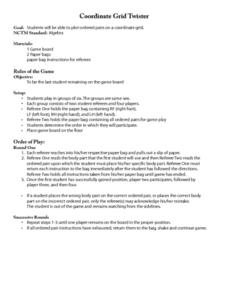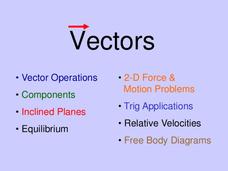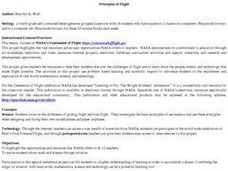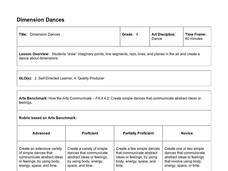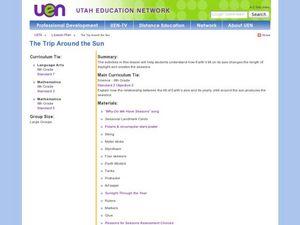Curated OER
Levers and Wedges in the Human Body
Young biologists identify parts of the body that serve as wedges (teeth and fingernails), and as levers (jaw, arms, and legs). The hands-on activities described here should be exciting for learners to perform, and should also lead to a...
Curated OER
Levers and Wedges in the Human Body
Students identify the various parts of the body that serve as wedges and levers, identifying the fulcrum for each body lever. They bite into carrots and apples to analyze how their jaws and teeth work, then complete three worksheets that...
Curated OER
Making and Using a Gel Person to Teach Human Anatomy
Students investigate organs, anatomical planes and transverse sections of the human body using gel people. In this human anatomy lesson plan, students use gel molds, gel and food items to make models of the human body. They create a...
Mathematics TEKS Toolkit
Am I Related to Myself?
Elementary or middle schoolers use ratios to discover some nearly constant relationships between measurements of parts of the human body. They find and record pairs of measurements and determine the relationship between the pairs. Pupils...
Curated OER
Mathematics Module
Delve into graphing! The concepts covered begin with basic graphing basic coordinates and algebraic expressions on coordinate planes, and build up to graphing linear inequalities and equations. Learners solve and simplify various...
Curated OER
Coordinate Grid Twister
Middle schoolers plot ordered pairs on a coordinate plane. Given a game board and other manipulatives, groups of students participate in a coordinate grid game where they stand and place their feet and hands on a given grid position....
Curated OER
Our Healthy Bodies
Students complete a variety of activities designed to enhance their awareness of their bodies. They examine pictures of themselves, taken at various points in the year and examine and compare their bodies. They enjoy a healthy snack...
Curated OER
Learning the Dissecting Planes
Students explore dissecting planes. In this biology lesson plan, students learn the basic vocabulary used in dissection, learn how to orient themselves on a three dimensional figure, and develop the manual dexterity necessary to use...
Curated OER
You are Uniquely You
Students compare and contrast simple machines and their functions. In this cross-curriculum science simple machines activity, students observe examples and read about simple machines, then use body movement to demonstrate how machines...
Curated OER
Body Defense and Disease
For this body defense and disease worksheet, students complete two multiple step questions about infectious diseases and how they are passed.
Curated OER
Anatomical Position & Directional Terms
Simple lists of anatomical terms fill the slides in this collection. It begins by explaining the general anatomic position and then goes into directional, body plane, and body cavity terms. The separate regions are categorized as head,...
Urbana School District
Vectors
I don't always make vector jokes, but when I do, IJK. Vector addition using multiple methods, scalar multiplication, vector subtraction, vector components, relative velocities, free body diagrams, and so much more Are covered in this...
Curated OER
Dayna Lykins, Leanna Prater
Fourth graders compare and contrast gliding flight and true flight. They investigate the basic principles of aeronautics. The class participates in activities to observe lift and the effect of air. Students design and fly their own...
Curated OER
Body Plans and Adaptations
For this body plans and adaptations worksheet, students will review the different types of symmetry found in organisms. Students will identify body parts as found on either the ventral or dorsal part of an animal. Then students will look...
Hawaiʻi State Department of Education
Dimension Dances
Use dance to help learners conceptualize line segments, rays, lines, and planes. They choreograph dances that show dimensional space. Dancers start by pondering space, point, and lines as the teacher draws them in the air. Each movement...
Hawaiʻi State Department of Education
Machines
What do science and dance have in common? Simple machines, work, and force! First, children discuss machines, wheels, inclined planes, and wedges. They create inclined planes with their bodies and make up dances about wheels and wedges....
Exploratorium
Descartes' Diver
Pique interest in water pressure, demonstrate buoyancy, and explore water displacement concepts with a homemade Cartesian diver. You may want to change the name of the toy, however, as is is not documented the Rene Descartes actually...
Cornell University
Buoyancy
Swimmers know to float by turning their bodies horizontally rather than vertically, but why does that make a difference? In an interesting lesson, scholars explore buoyancy and the properties of air and water. They test cups to see which...
Curated OER
The Trip Around the Sun
Sixth graders investigate the relationship between the tilt of the Earth's axis and the seasons. For this earth science lesson, 6th graders sing the song "Why Do We Have Seasons" and use simulate the Earth's tilt by using their bodies.
National Security Agency
What’s Your Coordinate?
Your middle schoolers will show what they know with their bodies when they become the coordinate plane in this conceptual development unit. Starting with the characteristics of the coordinate plane, learners develop their skills by...
Hawaiʻi State Department of Education
Symmetrical Objects
In order to better understand how to locate a plane of symmetry in 3-dimensional objects, learners create a dance. The class reviews dance and math symmetry, then they practice making symmetrical shapes and movements with a partner. They...
Curated OER
Choose the Correct Homophone II
Homophones are tough! Identify different homophones and how they're different. Common ones like son and sun and plain and plane are included. Some uncommon ones are also included, like bridal and bridle.
Curated OER
Let's Think About... Magnets and Gravity
Students watch an episode of the PBS show "Jay Jay the Jet Plane," and explore magnets and gravity. They conduct various experiments involving magnets and sand, bean bags, and a fishing pole with magnets.
Curated OER
Geometry: Practical Applications of the Distance Formula
Students, working independently and in groups, apply the distance formula to practical situations. After solving various problems, students in pairs design coordinate planes from the school blue print to measure the distance from the...
Other popular searches
- Body Planes and Cavities
- Anatomical Body Planes
- Body Planes and Directions
- Human Body Planes
- Wedges and Human Body
- Body Planes and Regions
- Lesson on Body Planes
- Label Body Planes
- Anatomy Body Planes
- Body Planes and Organs
- Human Body Wedges
- Planes of the Body







